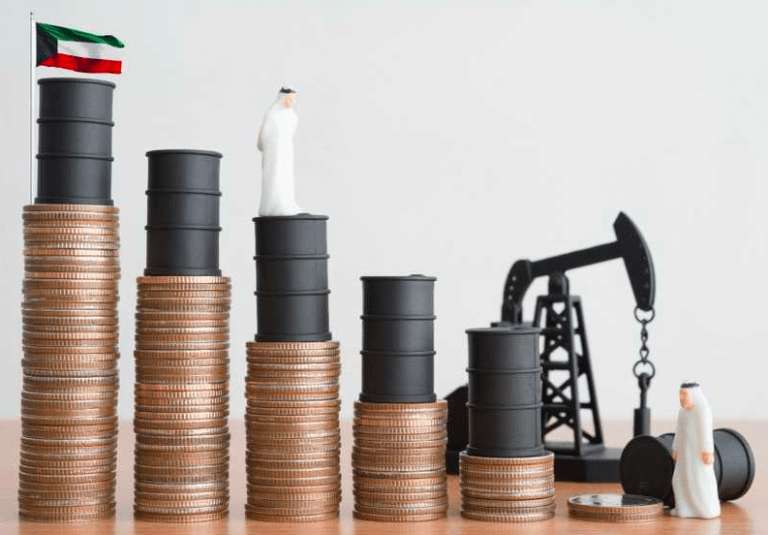Latest News
- Kuwait's Medicine Shortage Raises Eyebrows
- Increases In The Prices Of Fish
- Kuwait Launched Plans For A State-of-the-art New Cancer Control...
- Crime In Egypt; Accused Arrested In Kuwait
- Kuwaiti Students Participate In The Robotics World Championship...
- The New Work Permit Mechanism Is For One Year: PAM
- Kuwait Health Minister Announces Opening Of Advanced Cancer Cont...
- Kuwait's Amir To Attend International Economic Forum In Saudi Ar...
- Man Accused Of Gruesome Crime Referred To Psychiatry For Mental...
- Fashion Influencer And Accomplice Convicted For Social Media Pro...
- Kuwaiti Court Overturns Verdict In Traffic License Forgery Case
- Fashion Influencer And A Kuwaiti Jailed For Social Media Prostit...
Kuwait To Be The Largest Beneficiary From The Rise In Oil Prices

A report issued by Goldman Sachs expects a decrease in the financing needs of the Gulf states by about 10 billion dollars over the next three years. If oil prices continue to rise the financing needs would decrease from 270 billion dollars to 260 billion dollars.
The report suggested that Kuwait will witness the largest improvement in its budget among the Gulf countries. It is expected that its fiscal deficit will shrink by about 15% of GDP during 2021, but it is believed that the country is facing a liquidity crisis that cannot be resolved through high oil prices alone, Al Qabas reported.
Goldman Sachs report added that If the average oil price is at $ 65 a barrel for the next three years, the lending needs of the six Gulf states would decrease by 96% from what it would be if the oil prices were at $ 45 a barrel.
While oil prices have risen by 80% since the beginning of November to reach about $ 70 a barrel with the start of major economies, vaccination campaigns against the Coronavirus, and the continuation of OPEC + cuts in crude production. The average oil prices required to achieve balance in Gulf budgets was less than 50 dollars a barrel.
High oil
Goldman Sachs pointed out that the consequences of maintaining oil prices at current levels will positively affect the balance sheet of the Gulf countries, their creditworthiness, and their large debt markets. But there is also a possibility to wipe out part of those financial gains by high government spending. Gulf states raised about $ 63 billion last year through the issuance of bonds and Sukuk.
The report expects Saudi net debt to rise over the next three years to a level that can still be controlled at 38% of the Kingdom’s GDP, and also expected the Qatari fiscal balance to fluctuate from a deficit of 5% to a surplus of 5% of GDP.
Goldman Sachs said that Oman and Bahrain are likely to benefit more from the increase in oil prices, given their weaker financial conditions compared to other Gulf countries, which in turn may witness a more moderate improvement in their budgets ranging between 2% and 4% of GDP.
The performance of Gulf banks
In addition, the S&P Global Ratings agency expected that Gulf banks will face long-term negative effects from the double shock that occurred last year due to the Corona pandemic and the drop in oil prices, indicating that the banking sector in both Saudi Arabia and Qatar will be less affected by the double shock compared to With the Emirates, Oman and Bahrain.
As for the Kuwaiti banking sector, its recovery from the crisis will depend on the development of the current financial impasse in the country and how the government will exit from it to finance the fiscal deficit.
SOURCE : TIMES KUWAIT
Trending News
-
 Kuwait Implements Home Biometrics Services Ahead O...
14 April 2024
Kuwait Implements Home Biometrics Services Ahead O...
14 April 2024 -
 Kuwait Airways Provides Update On Flight Schedule...
14 April 2024
Kuwait Airways Provides Update On Flight Schedule...
14 April 2024 -
 Kuwait Airways Introduces Convenient Home Luggage...
15 April 2024
Kuwait Airways Introduces Convenient Home Luggage...
15 April 2024 -
 Expat Residency Law Amended By Kuwait Ministerial...
20 April 2024
Expat Residency Law Amended By Kuwait Ministerial...
20 April 2024 -
 Two Expats Are Arrested For Stealing From Salmiya...
17 April 2024
Two Expats Are Arrested For Stealing From Salmiya...
17 April 2024 -
 Kuwait Airways Resumes Flights To Beirut And Oman...
15 April 2024
Kuwait Airways Resumes Flights To Beirut And Oman...
15 April 2024 -
 Temperature Increases Cause Electricity Load Index...
21 April 2024
Temperature Increases Cause Electricity Load Index...
21 April 2024 -
 Thief Returns Stolen Money With An Apology Letter...
15 April 2024
Thief Returns Stolen Money With An Apology Letter...
15 April 2024 -
 3 Expats Caught In Salmiya With 213 Bottles Of Loc...
23 April 2024
3 Expats Caught In Salmiya With 213 Bottles Of Loc...
23 April 2024 -
 Ministry Of Interior Denies Social Media Rumors Re...
13 April 2024
Ministry Of Interior Denies Social Media Rumors Re...
13 April 2024












Comments Post Comment